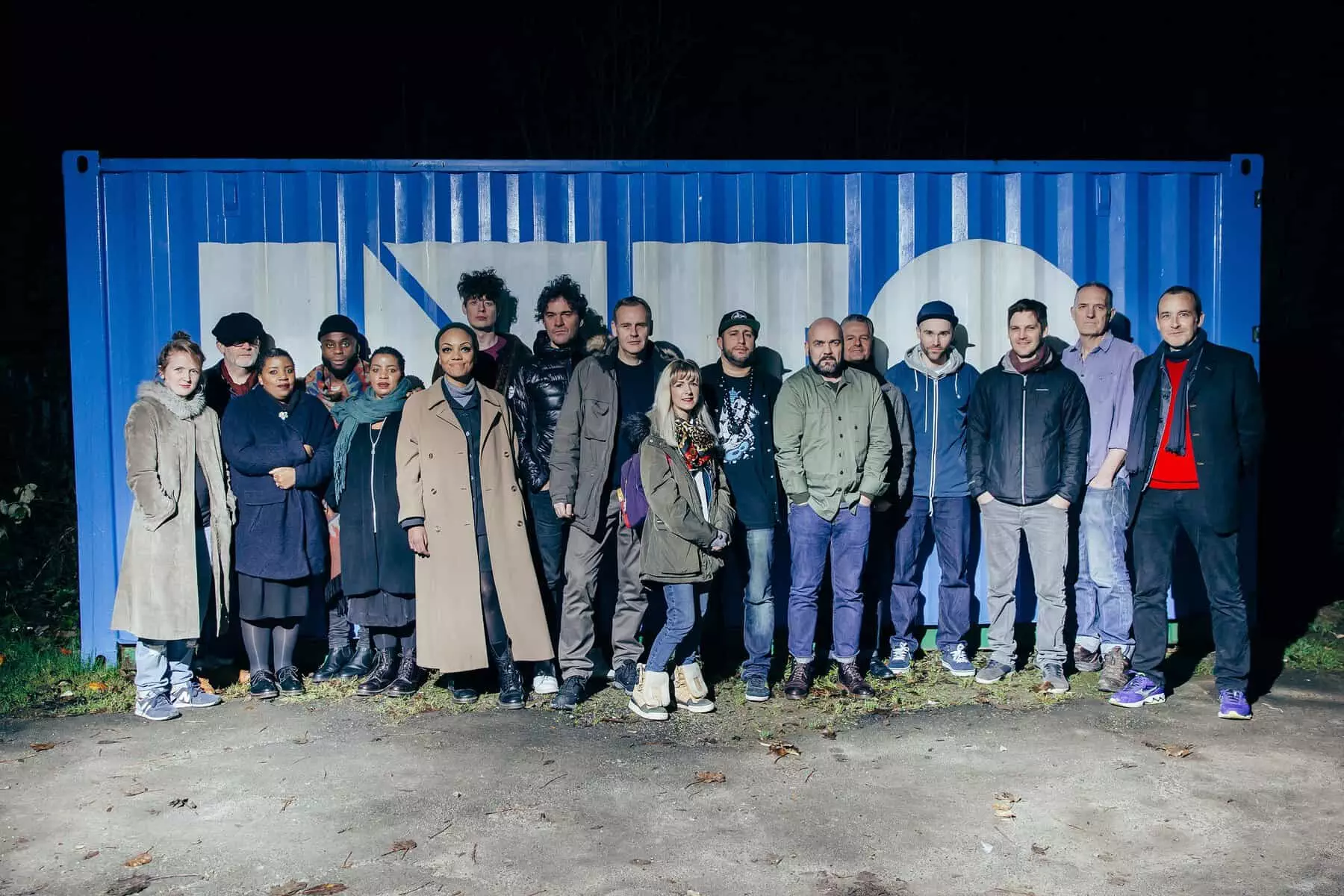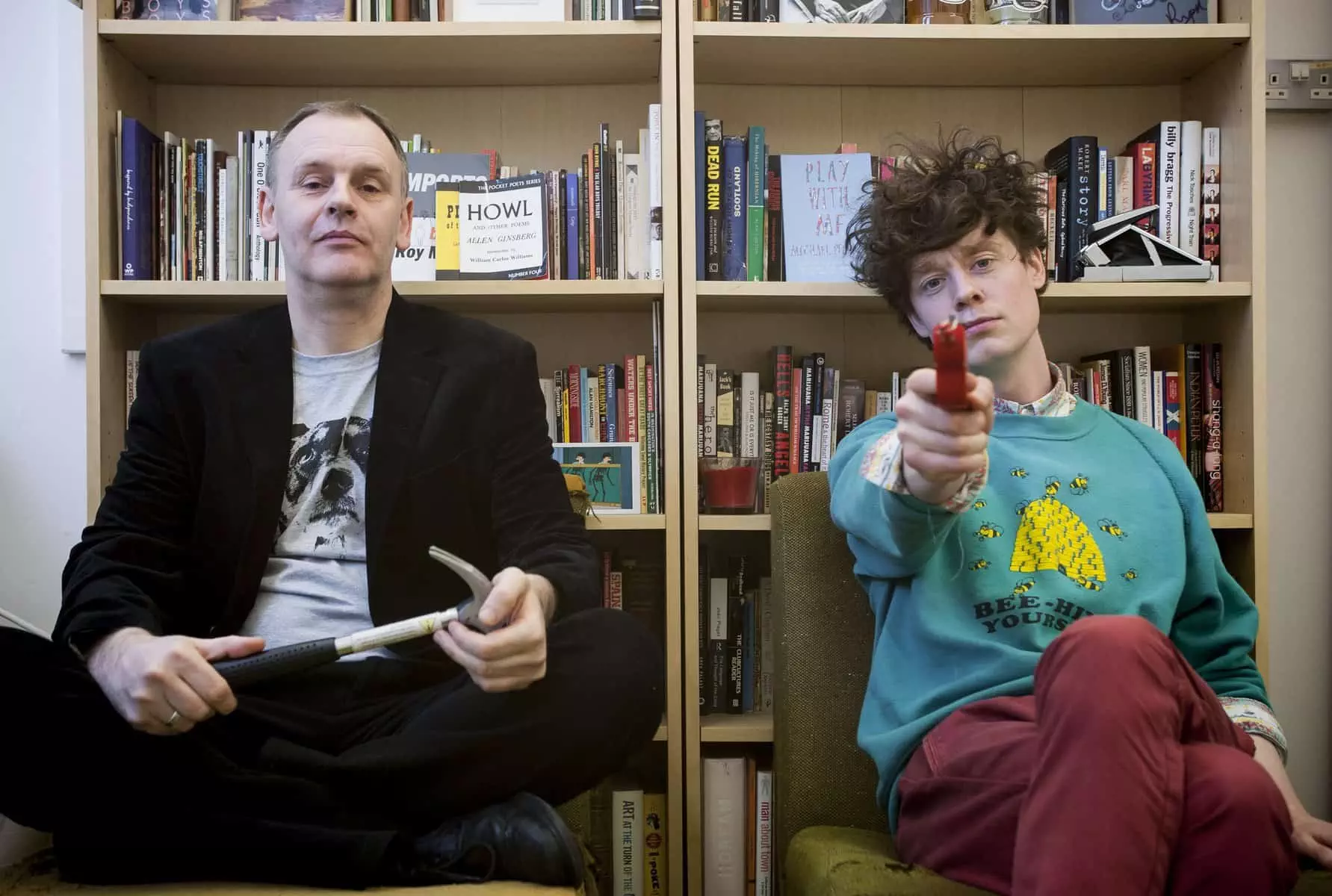
Last weekend in Hull, the Bowie referencing Where Are We Now? festival promised three days of questioning and mischief-making. NEIL MUDD took notes.
The name Neu! Reekie! is a hydra: no sooner have you put one meaning to the sword than two more have risen to take its place. German electronic progenitors Neu!, who inspired Bowie and Eno, are in there; so too is Auld Reekie, the popular nickname for Edinburgh with its grim whiff of poor sanitation and sulphurous chimney smoke. For its founders, Kevin Williamson and Michael Pedersen, Neu! Reekie! is a tip of the hat to poet and close-associate, Paul Reekie, who took his own life in 2010.
This weekend in Hull, as part of the Roots and Routes phase of the city’s programme for UK City of Culture 2017, the Scottish counter-cultural pranksters convened Where Are We Now? a multi-headed festival of politics, performance and provocation with a General Election firmly in its sights. At the start of Dybbuk, pop malcontent Momus’s cabaret tribute to David Bowie which launched the weekend, Williamson joked: “We’d like to thank Theresa May for organising this election for us. She’s fucked it up. We haven’t!”
Where Are We Now? #1
Even in a specially pared down version for Where Are We Now?, Dybbuk (the name means malicious possessing spirit) was unsettling. Simply attired in a traditional Japanese jinbei, Momus was at once awkward and beautiful, his performance part kabuki, part untutored shadow play. The singer alternated between hushed reverence and atavistic howling. An avowed Bowie aficionado, Momus channelled the jerky stage persona the artist adopted for his Diamond Dogs tour of North America in 1974.
Coy resonances abounded. Songs were mined for transgressive pay dirt – Candidate was deliciously lewd; Sweet Thing fashioned into something dark and unfathomable; Absolute Beginners was recast as a tender ballad a million miles away from the histrionic bluster of its former self. Even Ashes to Ashes was given a contemporary spin with the insertion of the line ‘My mother said ‘To get things done, you better vote for Jeremy Corbyn.’
Flickering footage offered restless visual clues to the alien otherness of Bowie’s words. At times it could be a little too knowing – when Andy Warhol materialized, Dybbuk’s lingua Bowie threatened to disappear down a rabbit hole – but somehow Momus pulled it off: “In a sense we all need to be the Bowie we wish to see,” he intoned.
Michael Pedersen said before the festival that the city’s decisive vote for Brexit was a political gulf between Neu! Reekie! and Hull. But for electoral red tape, Kevin Williamson was a parliamentary candidate in waiting calling for an Independent Hull within Scotland. The evening’s entertainment in Hull’s City Hall forced home the importance of multiculturalism and inclusivity. Any Brexiteers present either kept their own counsel or else shouted loudest so as not to be conspicuous.
With its programming of short films, Neu! Reekie! hopes to fuel imagination and debate between performances. Tonight there were mockumentaries, video mash-ups, strange Iron Curtain era animations, and Dutty Lingo, Bristol-born Michael Barnes-Wynters’ rebuttal of his adopted home city of Hull’s unjust reputation for cultural isolation. This entertaining film, with its close ups of mouths and discourse fractured by jump cuts, proposed an alternative narrative, namely one of connection.
Hollie McNish is a spirited exponent of the spoken-word form. Gifted and unorthodox, she won the Ted Hughes Award in 2016 for her poetry collection Nobody Told Me. She is a potty-mouthed force of nature. Asked to be counter-cultural she confessed, “I don’t even know what the fuck that means. The poems I’ve chosen are all positive because being positive these days feels pretty fucking counter-cultural.” Wow! expressed McNish’s wonder at her new-born daughter’s self-discovery; Mathematics was a coruscating demolition of bigotry; while Eat My Fig cauterized the chauvinistic paradoxes of hip-hop culture.
Dub-poet (‘I’m in the Oxford English Dictionary, albeit as a footnote’) and John Peel favourite, Linton Kwesi Johnson used his appearance to take political stock. His insistent charting of the black British experience has lost none of its urgency or its righteous anger with the passage of time. His poems are formidable, compassionate, moving. Sonny’s Lettah and Di Great Insohreckshan retain their shocking authority, but are lent renewed impetus and gravitas by the current brutal political climate.
Charlotte Church’s Late Night Pop Dungeon was a surprise inclusion when the line-up for Where Are We Now? was announced earlier in the year. No doubt it was designed to be. Neu! Reekie! prides itself on the diversity of its audience. First impressions may have suggested a Poundland Beyoncé fronting comedy rock outfit Tenacious D, but Church has always had street smarts, her instinct for pop evidenced in the effortless way she segued between eras and styles. Her tight-drilled entourage matched her move for move, the sheer kitsch brouhaha of it all leaving any naysayers in the audience silenced. Tonight Late Night Pop Dungeon invoked the metal funk clatter of Parliament or Sly & The Family Stone at the absolute height of their powers.
Mercury Prize winners Young Fathers began their set by announcing a declaration of independence: Hull was a ‘new country’ and the only rule was ‘All are welcome!’ Their performance was a blitzkrieg howl of rage and invective, so primal and raw that light fittings broke free of their housing. Familiar songs disintegrated in the blast wave. The band did not so much torch their set as napalm it! Blinking in the aftermath, audience members looked about them as if to ask, ‘What just happened?’ Incendiary barely begins to express it.
Where Are We Now? #2
The second day was mostly about hip-hop. Local acts, graffiti artists and break-dancers congregated in the afternoon at the waterfront Dock Stage. Friends met, families made a day of it and a community was formed.
Ducking inside the cinema for a screening of I Am Belfast felt counter-intuitive. “You must all be hardened cinema fanatics to come in here out of the warm sunshine,” marvelled the film’s director Mark Cousins by way of greeting.
Cousins moved away from Belfast in his late-teens and never really returned. His twin brother Jeffrey lives there still and never really moved away. I Am Belfast maps the imagination of the city as it emerged from the fog of the low temperature war fought there until the Good Friday Agreement brought hostilities to a close. The director spent six months walking every street, gradually attuning to the hum of reconnection – ‘something now reminds you of something then.’
Exquisitely shot by cinematographer Christopher Doyle, with a palette of autumnal colours to match the film’s melancholy tone, every precisely captured frame is flush with connotation. A meditation on self-loss and rediscovery, the script written by Cousins is lyrical, allusive – a catch-up dialogue with the city he left behind.
Belfast itself is personified in the strikingly handsome form of actress Helena Bereen who possesses one of those faces that cinema seems to have forgotten. One particular close-up shot is held as passion spills down her cheeks in runnels. She embodies the perceived duality of her namesake – what Cousins describes in the film as ‘salt and sweet.’
I Am Belfast is a gentle film. The director likes gentle films he confessed afterwards, one’s with structure, but not necessarily a story. Making it was not about closure. He wanted to show that “one of the most important things to recover after a war is imagination.” Describing both Belfast and Hull as ‘under-imagined’ cities, Cousins asked the question, Where are Hull’s film-makers?
That evening’s block party at The Welly drew a vibrant, largely young crowd. Underground hip-hop exponents The Four Owls ragged the audience with their frenetic call and response, while local B-Boys Redeye, Clarksman and Playa One riffed Hull-style over sinewy bass rhythms and transformative scratch mixing from DJ Fast T.
But it was Akala everyone had inevitably turned out for, and who owned the joint from the moment he took to the tiny stage. He was charismatic, smart, punctuating his set with lucid critiques of the arms trade, the shaky divisiveness of Tory economics and why Thursday’s General Election was the most important in his lifetime. He sermonised with warmth and self-assurance, revealing a refreshing instinct for a sharp lyric: ‘True strength is the strength to be honest / And if I’m honest I am just tired … / Tired of pretending like it don’t hurt my heart / of wanting change, but not knowing where to start.’
Where Are We Now #3
Bill Drummond’s closing day appearance promised Hull its darkest thoughts back, culled from two days guerrilla shoe-shining around the city. However, nothing is ever straightforward where Drummond is concerned, and his ‘lecture’, entitled Forty Darkest Thoughts, amounted to six or seven at most.
In mitigation he spun a shaggy cat story, a tangential confessional in which the young Bill swallowed the migrating soul of his cat Tensing and conceived his life as a single artistic construct. Drummond was ridiculous, entertaining fun. His multi-layered thesis merely amounted to an admission of failure, a picaresque distraction from the fact ‘his entire talk was supposed to be about something else.’
Following Drummond on the tiny raised stage was the Caught By The River Revue, a snapshot in words of the decade old website A showcase for some of the finest writing online, Caught By The River was conceived by Heavenly Records label-boss Jeff Barret as a bolt-hole for misfits and dreamers. The site’s guiding aesthetic is bound up with the late Roger Deakin whose writings about nature and folklore still resonate with an age-old veracity.
First up was Faber New Poet, Will Burns, whose sharply observed vignettes of suburban encroachment crackle with the voltage of language. Thick with meaning and exhilarating leaps of association, Burns’s forensic facility with form was matched by Martha Sprackland whose poetry, she admitted, tends to be all about smashing things – a eulogy for a snail finds the poet riven with horror and remorse, while a dropped iPhone conjures a discourse on mortality. Writer Adelle Stripe concluded the event with a reading from her debut novel, Black Teeth and a Brilliant Smile about the short life of Bradford playwright Andrea Dunbar. Stripe paced the stage as she read, occasionally breaking off to offer some nugget of context. The earthy mix of belligerence and humility in Dunbar’s character has been assiduously captured by Stripe who has the sparseness and control of Nell Dunn or Shelagh Delaney.
As the room emptied afterwards, and the Caught By The River collective adjourned to the Minerva for some post-performance ales, Bill Drummond could be heard in the venue’s café cursing the things he forgot to mention in his lecture. One of the dark thoughts he had managed to collect the previous day was ‘We are the last in line, the end of the track, the forgotten people.’
This weekend at least, Neu! Reekie! have had a hand in challenging that.
A shorter version of this review first appeared in The Morning Star.
